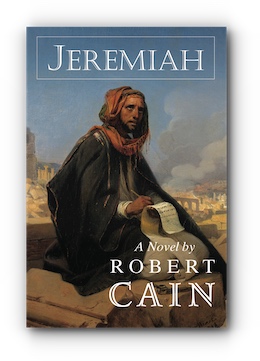| ||||||||||||||||||||
| Category: Fiction:Historical |
(requires Adobe Reader)
|
| About the Book | |
|
Shalev, a wandering merchant, is payed to take Jeremiah to a group of ascetics living in the hills near Jericho. Along the way there are interactions with people and tests of endurance which begin to widen Jeremiahís knowledge of life and allow Godís Spirit to grow within him; the spoiled, carefree boy is beginning to grow up mentally, physically and spiritually. Jeremiah begins to recognize that the simplicity of established religion is childís play in light of the majesty and power of Godís interaction within the world. ďWill this place help me find true happiness?Ē This is the initial question from Jeremiahís lips upon arriving at the ascetic community. The human Jeremiah yearns for the physical identity and security that the world furnishes, yet his spirit wishes to commune with its Creator. Thus, Jeremiah is torn in two. God, of course, prevails as Jeremiah is drawn closer in spirit by visions and discernment. A dramatic vision culminates with Jeremiahís profession of faith in God and full acceptance of his calling, completing the seven years he has spent in the desert. He is now a prophet with a divine mission. The prophet Jeremiah proclaims Godís words to the people of Jerusalem, but they choose not to hear. In fact, the leaders of Judah no longer want their country to be a vassal state of the Babylonian Empire and compel the king to revolt. Because of Judahís sinfulness, the people and land must be punished then cleansed. King Nebuchadnezzar of Babylon is the instrument the Lord employs to achieve this. Judah is invaded. The sacking, burning and destruction of Jerusalem and the Temple is the termination of Godís covenant relationship with his people; God no longer resides in their midst. Jeremiah, his disciple Baruch and a palace servant named EBED travel to Mizpah, a modest city north of Jerusalem. As the prophet awaits an answer from God as to what he must do next, terror strikes. A rogue Judean army attacks the city as retribution for siding with the Babylonians. Gedaliah is assassinated and hundreds of men, women and children are slaughtered. The remaining population, including Jeremiah and his companions are marched off into the desert. The Judean general Johanan comes to their rescue and is hailed by the people as their savior. The decision is made to head south, to Egypt, where they will find happiness, peace and comfort, but the Lord God commands them to remain in the Promised Land. The people ignore Godís wishes and the journey to Egypt commences. Jeremiah continues to insist that they do not step onto foreign soil, or Godís punishment will follow. They cross into Egypt and are embraced. It seems all is well; they have found peace and happiness after all. Jeremiah says no. The prophet declares that no one who crossed over the border onto Egyptian soil will ever return to the land of God. For saying this, the prophet Jeremiah is stoned to death by his own people. The demonic and human evils that have ever been near him prevail.
|
|
| About the Author | |
 |
Robert Cain lived in Illinois and Oklahoma for most of his early life. He enlisted in the U.S. Navy and later graduated from university with a degree in Political Science. After finishing Catholic seminary, Robert served as a parish priest and hospital chaplain for several years before receiving his commission into the U.S. Navy as a chaplain. After retiring with twenty-years of service, he now resides in Delaware with his Cavalier King Charles Spaniel Buster. |

